Acknowledging Racism and White Privilege
 |
| Image from amazon |
Thomas, P., & Harker, L. (2003). The skin I’m in: a first look at racism. Hauppauge, NY: Barron's Educational Series.
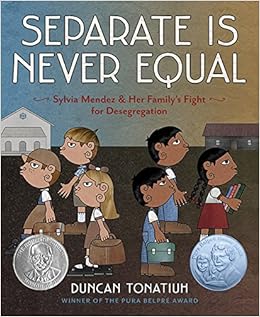 |
| Image from amazon |
Separate Is Never Equal: Sylvia Mendez and Her Family’s Fight for Desegregation (2014) by Duncan Tonatiuh. This title tells the story of Sylvia Mendez and her family’s fight against segregated schools in California for the Hispanic community. Their fight against segregated education happened almost ten years before Brown vs. The Board of Education.
Tonatiuh, D. (2014). Separate is never equal: sylvia mendez and her family’s fight for desegregation. New York, NY: Harry N. Abrams.
 |
| Image from amazon |
Rosen, M. (2005). This is our house. Somerville, MA: Candlewick Press.
Historical Books
| Image from barnes & noble |
Levine, E., & Nelson, K. (2007). Henry’s freedom box: a true story from the underground railroad. New York, NY: Scholastic Press.
 |
| Image from amazon |
Pink and Say (1994) by Patricia Polacco. This title tells the story of an African American family risking their lives to care for a wounded white boy during the American Civil War.
Polacco, P. (1994). Pink and say. New York, NY: Philomel Books.
 |
| Image from amazon |
White Socks Only (1996) by author Evelyn Coleman and illustrator Tyrone Geter. In this title, a little African American girl thinks she can drink from a “whites only” fountain because she is wearing white socks.
Coleman, E., & Geter, T. (1996). White socks only. Park Ridge, IL: Albert Whitman & Company.
Featuring African American Children
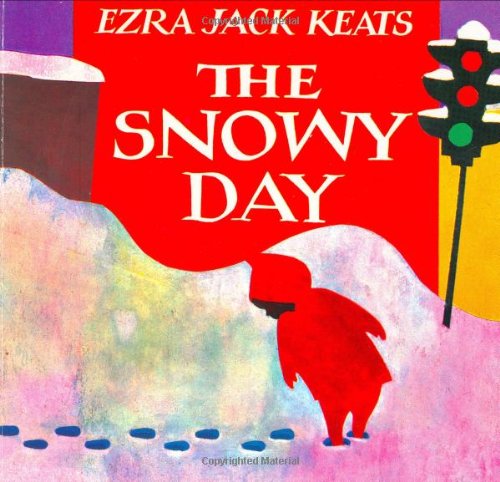 |
| Image from amazon |
The Snowy Day (1962) by Ezra Jack Keats. This title features an African American child experiencing the beauty and wonder of a snowfall.
Keats, E. (1962). The snowy day. New York, NY: Viking.
 |
| Image from amazon |
Peeny Butter Fudge (2009) by authors Toni Morrison and Slade Morrison and illustrator Joe Cepeda. This title tells the story of three African American children spending a wonderful day with their Nana.
Morrison, T., Morrison, S., & Cepeda, J. (2009). Peeny butter fudge. New York, NY: Simon & Schuster.
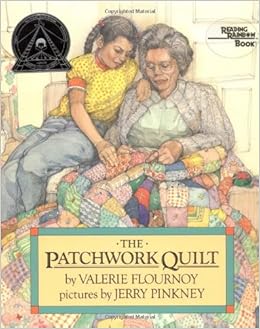 |
| Image from amazon |
This title is about young Tanya, who listens to her grandmother explain the family members and events that inspired each patch of the quilt she is making.
Flournoy, V., & Pinkney, J. (1985). The patchwork quilt. New York, NY: Dial Books.
Featuring Native American Children
 |
| Image from amazon |
Saltypie: A Choctaw Journey from Darkness into Light (2010) by author Tim Tingle and illustrator Karen Clarkson. This book is about Saltypie explaining his family’s difficult history before and after making the move from Oklahoma to Texas. He explains the many difficulties his Choctaw grandmother faced, including bullying and changing her own name.
Tingle, T. & Clarkson, K. (2010). Saltypie: a choctaw journey from darkness into light. El Paso, TX: Cinco Puntos Press.
 |
| Image from amazon |
Cradle Me (2012) by author Debby Slier. This book features pictures of real Native American babies doing small actions, like smiling, sleeping, etc. Underneath each picture is the word of the action in English and then a blank space for the parent to fill in that word in their native language.
Siler, D. (2012). Cradle me. Cambridge, MA: Bright Star Books.
| Image from little brown books |
Thunder Boy Jr. (2016) by author Sherman Alexie and illustrator Yuyi Morales. In this title, Thunder Jr. doesn’t want to be named after his father. He decides he wants his name to celebrate something he has done himself.
Alexie, S. (2016). Thunder boy jr. New York, NY: Little, Brown Books for Young Readers.
Featuring Asian Children
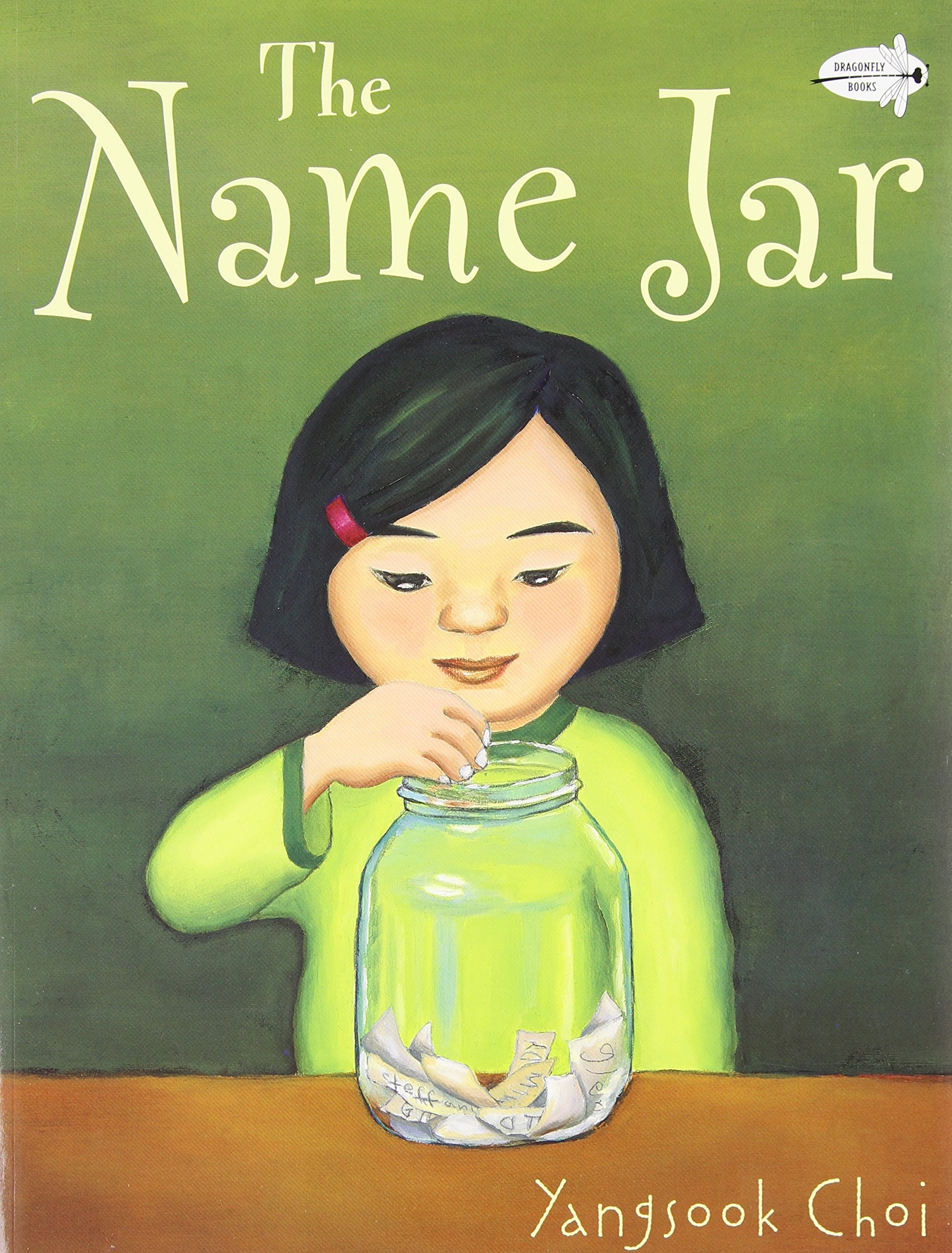 |
| Image from amazon |
Choi, Y. (2003). The name jar. New York, NY: Dragonfly Books.
 |
| Image from amazon |
You Were the First (2003) by author Patricia MacLachlan and illustrator Stephanie Graegin. This title shows an Asian baby going through his first milestones with his parents.
McLachlan, P. & Graegin, S. (2003). You were the first. New York, NY: Little, Brown Books for Young Readers.
 Nim and the War Effort (1997) by author Milly Lee and illustrator Yangsook Choi. This title is about the story of a young Chinese American named Nim, who wants to help with the WWII effort by participating in a paper drive. But when Nim finds out a rival is cheating to beat her in the drive, Nim goes above and beyond to prove she can win honestly.
Nim and the War Effort (1997) by author Milly Lee and illustrator Yangsook Choi. This title is about the story of a young Chinese American named Nim, who wants to help with the WWII effort by participating in a paper drive. But when Nim finds out a rival is cheating to beat her in the drive, Nim goes above and beyond to prove she can win honestly.
Lee, M. & Choi, Y. (1997). Nim and the war effort. New York, NY: Square Fish Publishing.
Featuring Latino Children
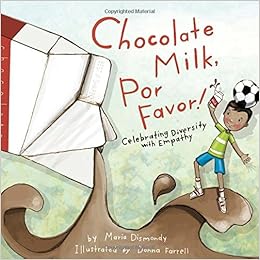 |
| Image from amazon |
Dismondy, M., & Farrell, D. (2015). Chocolate milk, por favor: celebrating diversity with empathy. Lansing, MI: Cardinal Rule Press.
 |
| Image from amazon |
From North to South: Del Norte al Sure (2013) by author René Laínez and illustrator Joe Cepeda. Young José struggles after his mother is deported.
Lainez, R. & Cepeda, J. (2013). From north to south: del norte al sure. New York, NY: Children's Book Press.
 |
| Image from amazon |
The Rainbow Tulip (1999) by author Pat Mora and illustrator Elizabeth Sayles. This title is inspired by a story of the author’s mother's childhood. Stella is proud of her heritage, but becomes concerned when she has to dress up for the school parade since she won’t look like any of the other girls.
Mora, P. & Sayles, E. (1999). The rainbow tulip. New York, NY: Puffin Books.
Featuring Middle Eastern Children
 |
| Image from amazon |
Abdullah, R., DiPucchio, K., & Tusa, T. (2010). The sandwich shop. New York, NY: Disney-Hyperion.
 |
| Image from amazon |
Faruqi, R. & Lyon, L. (2015). Lailah’s lunchbox: a ramadan story. Thomaston, MA: Tilbury House Publishers.
 |
| Image from amazon |
No comments:
Post a Comment